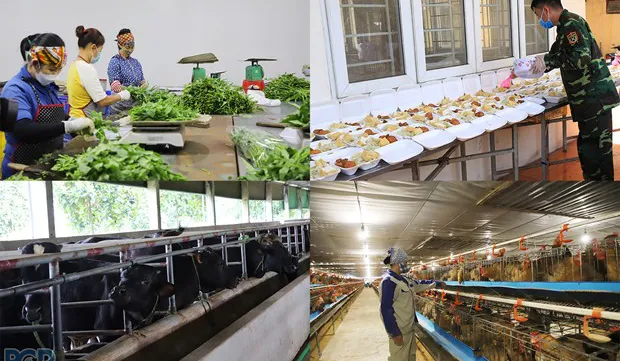Bac Giang province expands food safety models

Deputy Director of the provincial Department of Health Nguyen Thi Thu Huong said that in the second quarter of this year, the province will continue to develop and expand chains of safe agricultural, forestry, and fishery production models. The production and processing of traditional food products in villages will be also given attention.
The province will also continue multiplying model restaurants, canteens, and ready-to-eat meal processing establishments that meet food safety requirements. Those models have been proven effective in controlling food safety in chains, reducing the risk of food poisoning and preventing incidents relating to unsafe food.
Ensuring food safety has been part of campaigns and emulation movements of socio-political organisations such as the campaign "Women nationwide implement food hygiene and safety for family and community health”, production and trade of safe agricultural products, start-ups with safe food production or "The entire people unite in building new-style rural areas and civilised urban areas".
Huong said that in the second quarter, the province will focus on implementing communication campaigns, inspections, and post-inspection over food safety, particularly during the food safety action month from April 15 to May 15, 2023.
In addition, the province will actively implement measures to prevent and control diseases and incidents related to unsafe food. The province will also prepare sufficient resources to promptly respond to such diseases or incidents.
Moreover, it is focusing on applying good agricultural practices (VietGAP, GlobalGAP), clean production technology, and biotechnology; developing organic agriculture; ensuring food safety and hygiene; and protecting the environment. It encourages the building of ecological and environment-friendly agricultural models such as organic agriculture and closed-loop circular agriculture.
The province plans to increase its quality rice growing area to 55,000 hectares and fruit tree planting area to about 55,000 hectares, with a focus on growing lychee, citrus (orange, pomelo), longan, custard apple, pineapple, and guava following VietGAP and GlobalGAP standards.
By 2030, the province will also expand its vegetable production area to 28,000 ha with 12,500 ha meeting VietGAP standards. At the same time, the locality will maintain the breeding of 1-1.2 million pigs, and 22-25 million poultry heads.
In the first three months of this year, Bac Giang province established 252 food safety inspection groups. They inspected and conduct post-inspection examination at nearly 3,000 food establishments or 91.7% of the total number of establishments in the province.
Of the inspected establishments, 242 were found to fail to meet food safety requirements, 21 were fined while 221 were warned, mostly due to improper sanitary conditions of facilities, equipment, and staff.
Meanwhile, police and market surveillance agencies examined and handled 89 violation cases related to trade fraud in food safety. Authorities confiscated and destroyed smuggled food of unknown origin, including 44.5 tonnes of animal products, and 8 tonnes of confectionery products of all kinds.
Socio-political organisations have joined hands to popularise knowledge and laws on ensuring food safety. They also called on people to use food with a clear origin, and instruct people to learn about, access and register products on the food safety portal.
Food producers, traders, and communities were called on to update information about safe food production, promote the development of clean food production, and identify risks of unsafe food.
As of March this year, VietGAP standards have been applied on 8,308 ha of vegetables, fruits, and aquaculture, including over 3,660 ha for vegetable intensive farming, nearly 4,000 ha for fruit farms, and 658 ha for aquaculture.
The province now has 128,000 pigs and poultry heads raised in line with VietGAP standards. A total of 1,822 food establishments in the province have been certified to meet food safety requirements./.





